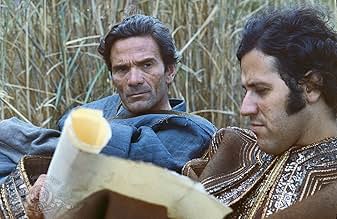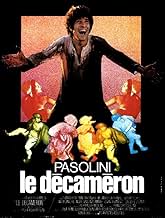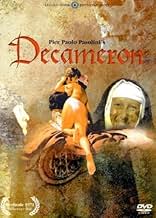AVALIAÇÃO DA IMDb
7,0/10
13 mil
SUA AVALIAÇÃO
Adaptação de nove contos do "Decamerão" de Boccaccio.Adaptação de nove contos do "Decamerão" de Boccaccio.Adaptação de nove contos do "Decamerão" de Boccaccio.
- Direção
- Roteiristas
- Artistas
- Prêmios
- 1 vitória e 3 indicações no total
Jovan Jovanovic
- Rustico
- (cenas deletadas)
Maria Gabriella Maione
- Una madonna
- (as Gabriella Frankel)
Pier Paolo Pasolini
- Allievo di Giotto
- (as P.P. Pasolini)
- Direção
- Roteiristas
- Elenco e equipe completos
- Produção, bilheteria e muito mais no IMDbPro
Avaliações em destaque
This film is a portmanteau film based on the famous 14th Century Italian story collection "The Decameron" by Giovanni Boccaccio. The book deals with ten people telling a story each every day for ten days, but Pier Paolo Pasolini (for obvious reasons) chooses merely nine stories for his film. Most of the stories deal with sex or deception (usually both).
Like all portmanteau films, some stories are better than others, but most of the stories in this film are so short that, if you don't enjoy one story, you don't have to wait long for the next one.
The film depicts a world filled with dirt and vulgarity but also full of life. Pasolini used a lot of ordinary people in his films and here we see many of the actors are not conventionally attractive (for example many have bad, or missing, teeth). Pasolini appears in the film as a pupil of the painter Giotto who is assigned to paint a mural on the wall of a church.
I found this film funny, charming and very entertaining. Definitely for adults though, there is quite a lot of sex and nudity on display here.
This was the first film in Pasolini's so-called "Trilogy of Life" and was followed by "The Canterbury Tales" and "The Arabian Nights".
Like all portmanteau films, some stories are better than others, but most of the stories in this film are so short that, if you don't enjoy one story, you don't have to wait long for the next one.
The film depicts a world filled with dirt and vulgarity but also full of life. Pasolini used a lot of ordinary people in his films and here we see many of the actors are not conventionally attractive (for example many have bad, or missing, teeth). Pasolini appears in the film as a pupil of the painter Giotto who is assigned to paint a mural on the wall of a church.
I found this film funny, charming and very entertaining. Definitely for adults though, there is quite a lot of sex and nudity on display here.
This was the first film in Pasolini's so-called "Trilogy of Life" and was followed by "The Canterbury Tales" and "The Arabian Nights".
This is the first of Pasolini's three feature-film adaptations of obscene tales of antiquity, the other two being "The Canterbury Tales" and "The Arabian Nights." It contains ten of Boccaccio's most famous tales
The bawdiest story concerns a merchant who back-doors his partner's wife by promising to tell her his secret of turning a woman to a female horse and back to a woman again...
The tale of the two lovers sleeping together on the terrace is quite nice and very erotic, but the most hilarious one involves a young man who pretends he's a deaf mute in order to get into a convent... Once inside, he discovers that the sisters are very curious about all the excitement the world has made over sex and want to find out if it is worth it...
The stories are quite funny and the acting is adequate especially for non-professionals But the film's charm is in its unrefined energy It spends as much time showing nude men as it does showing nude women, which was quite unusual for its time
The tale of the two lovers sleeping together on the terrace is quite nice and very erotic, but the most hilarious one involves a young man who pretends he's a deaf mute in order to get into a convent... Once inside, he discovers that the sisters are very curious about all the excitement the world has made over sex and want to find out if it is worth it...
The stories are quite funny and the acting is adequate especially for non-professionals But the film's charm is in its unrefined energy It spends as much time showing nude men as it does showing nude women, which was quite unusual for its time
I haven't yet seen too many Pasolini films / I intend to do so though... I suppose many combine him with the disgusting Salo (100 days in Sodoma) but thats not the case here.
In Decameron is actually several shorts, 9 or so, a series of funny tales in medieval Italy with similar touch and atmosphere. The humour is great, we had various laughs in almost every single bit. Some of the humour might of course offend hardcore Christians, but this is by no means a minus in my book. Pasolini's assault to this eras ethics is truly a delight! And even if this dates back to 1971, the stories remain fresh and provocative as is, and this is the height of Pasolini's vision.
Many indicated this as erotic. Sure, there is much of full frontal male and female nudity, some of which quite stimulating, which might be too much for some. But this ain't no erotic film. There are stories which have not erotic element in - and there are nude scenes which function as laugh scenes. Overall, this is a multi-layered short-stories film. I RECOMMEND THIS TO ALL FANS OF COMEDY & European FILMS.
In Decameron is actually several shorts, 9 or so, a series of funny tales in medieval Italy with similar touch and atmosphere. The humour is great, we had various laughs in almost every single bit. Some of the humour might of course offend hardcore Christians, but this is by no means a minus in my book. Pasolini's assault to this eras ethics is truly a delight! And even if this dates back to 1971, the stories remain fresh and provocative as is, and this is the height of Pasolini's vision.
Many indicated this as erotic. Sure, there is much of full frontal male and female nudity, some of which quite stimulating, which might be too much for some. But this ain't no erotic film. There are stories which have not erotic element in - and there are nude scenes which function as laugh scenes. Overall, this is a multi-layered short-stories film. I RECOMMEND THIS TO ALL FANS OF COMEDY & European FILMS.
Film lovers know "Andrei Rublov," that Russian film about an icon painter. The beauty of the film comes in part because the filmmaker is on the same quest as his character, and that quest has as its core the discovery of beauty. The interesting thing about movies is that they create and sustain a fantasy world that lives beyond any one movie and into which we assume each movie is born. That world has its own type of beauty, one born of color and glamor and poise.
Paosolini does the same thing as Tarkovsky, but where Tarkovsky dealt with cosmic beauty and recognition, this artist has simpler goals: to engage with flesh, to flow with the simple streams of ignoble daily motion, and to discover beauty in that plain world.
Oh, what a terrific cinematic place to visit! This is a far from that collection of movie metaphors and beauty as we can go. There is no movie acting here. There is no external beauty. There is no recourse to familiar characters or representation. As usual, he draws his source material from matter that is not only before cinema, but before any popular writing.
And he works with that material outside any movie tricks. Well, he still has that Italian tendency to believe that the world is populated by characters and not situations or any sort of fateful flow. Just people who do things. Lots of little things, usually associated with pleasure.
So if you are building a world of cinematic imagination you need to have this as one of your corners. That's silly, every one of us is building a cinematic imagination we cannot avoid it. What I mean to say is that if you are building an imagination, some of which you understand and can use, some of which you actually want and can enjoy without being sucked into reflex...
If you want to just relate to people as people and test how easy it is to find grace in the strangest of faces, then this is your movie voyage for the night.
One rather shocking thing is how the nudity works. In "ordinary" film, we thing nothing of seeing two people humping and moaning, nude pelvises grinding is the most hungry of ways. But we gasp when some genital is shown. Here, the exact reverse is found: no shyness about the obvious existence of genitals, an erection even. A sleeping girl with her hand in her lover's crotch. DIsplayed as if it were in the same cinematic territory as the faces he finds.
But when these characters lay on each other for sex, we have the most prurient of actor's postures. I think this was done simply to avoid an automatic sweep into ordinary film ways. It has that effect anyway.
I don't know anyone that chooses more interesting faces. Distinctly Southern European, odd atypical faces.
And finally, there is the bit of his own story inserted, the artist in the church. Creating scenarios of rich life. In the movie, the most amazing scenes are those that have little or nothing to do with the story. There's a "death" tableau that could be the richest single shot I have ever seen, anywhere.
Ted's Evaluation -- 3 of 3: Worth watching.
Paosolini does the same thing as Tarkovsky, but where Tarkovsky dealt with cosmic beauty and recognition, this artist has simpler goals: to engage with flesh, to flow with the simple streams of ignoble daily motion, and to discover beauty in that plain world.
Oh, what a terrific cinematic place to visit! This is a far from that collection of movie metaphors and beauty as we can go. There is no movie acting here. There is no external beauty. There is no recourse to familiar characters or representation. As usual, he draws his source material from matter that is not only before cinema, but before any popular writing.
And he works with that material outside any movie tricks. Well, he still has that Italian tendency to believe that the world is populated by characters and not situations or any sort of fateful flow. Just people who do things. Lots of little things, usually associated with pleasure.
So if you are building a world of cinematic imagination you need to have this as one of your corners. That's silly, every one of us is building a cinematic imagination we cannot avoid it. What I mean to say is that if you are building an imagination, some of which you understand and can use, some of which you actually want and can enjoy without being sucked into reflex...
If you want to just relate to people as people and test how easy it is to find grace in the strangest of faces, then this is your movie voyage for the night.
One rather shocking thing is how the nudity works. In "ordinary" film, we thing nothing of seeing two people humping and moaning, nude pelvises grinding is the most hungry of ways. But we gasp when some genital is shown. Here, the exact reverse is found: no shyness about the obvious existence of genitals, an erection even. A sleeping girl with her hand in her lover's crotch. DIsplayed as if it were in the same cinematic territory as the faces he finds.
But when these characters lay on each other for sex, we have the most prurient of actor's postures. I think this was done simply to avoid an automatic sweep into ordinary film ways. It has that effect anyway.
I don't know anyone that chooses more interesting faces. Distinctly Southern European, odd atypical faces.
And finally, there is the bit of his own story inserted, the artist in the church. Creating scenarios of rich life. In the movie, the most amazing scenes are those that have little or nothing to do with the story. There's a "death" tableau that could be the richest single shot I have ever seen, anywhere.
Ted's Evaluation -- 3 of 3: Worth watching.
The first of what became Pier Poalo Pasolini's Trilogy of Life, with each film adapting stories from archaic literature. In this case, Giovanni Boccaccio's book of the same name, written in 14th century Italy. The film takes nine of the 100 stories from the book and weaves them into vignettes of everyday Medieval life. We see nymphomaniac nuns, grave robbing, deceit, and cuckolding. In one segment, a boy is lured into the house of a pretty girl. She tells him that he is her brother. however, after taking his clothes and money, the boy is thrown out, where he is picked up by a couple of thieves who recruit him to climb inside of a tomb and steal the recently dead archbishop's ruby ring. The boy is left trapped in the grave.
This bawdy romp is a lot of fun. This was a surprise being Pasolini. The portmanteau style storytelling works well with this roaming tour through a debauched, ancient landscape. Many of the oddball characters were non- actors (something Pasolini had used throughout his career), and some have such incredibly rickety teeth, and are a strange and uncomfortable, yet thoroughly enjoyable watch.
The film ends with a statement by Pasolini himself (he played the painter, Giotto between, and within some of the stories), which is possibly a statement about the dream like quality the narrative has in its assemblage of the parts. He says: Why create a work of art, when you can just dream about it? Indeed, why create narrative cinema, when you can manoeuvre through scenes of life and create a patchwork of living, permeated with verisimilitude.
www.the-wrath-of-blog.blogspot.com
This bawdy romp is a lot of fun. This was a surprise being Pasolini. The portmanteau style storytelling works well with this roaming tour through a debauched, ancient landscape. Many of the oddball characters were non- actors (something Pasolini had used throughout his career), and some have such incredibly rickety teeth, and are a strange and uncomfortable, yet thoroughly enjoyable watch.
The film ends with a statement by Pasolini himself (he played the painter, Giotto between, and within some of the stories), which is possibly a statement about the dream like quality the narrative has in its assemblage of the parts. He says: Why create a work of art, when you can just dream about it? Indeed, why create narrative cinema, when you can manoeuvre through scenes of life and create a patchwork of living, permeated with verisimilitude.
www.the-wrath-of-blog.blogspot.com
Você sabia?
- CuriosidadesO Decameron (1971) is the first film in Pier Paolo Pasolini's "Trilogy of Life," continuing with Os Contos de Canterbury (1972) and concluding with As Mil e Uma Noites (1974). Each film was an adaptation of a different piece of classical literature focusing on ribald and often irreligious themes. The tales contain abundant nudity, sex, slapstick and scatological humor.
- Erros de gravaçãoWhen the Mother Superior seduces the deaf-mute boy, he's sleeping in a tomato garden. Tomatoes are a New World crop that wouldn't be brought to Italy for another two centuries. The same is true of the corn (maize) growing in the convent's little field.
- Citações
Allievo di Giotto: Why create a work of art when dreaming about it is so much sweeter?
- Versões alternativasAlthough the cinema version was intact the 1988 UK Warner video was cut by 22 secs by the BBFC to remove shots of naked genitals during the bedroom sex scene with the nun. The cuts were fully restored in the 2001 BFI DVD release.
- ConexõesEdited into Porno & libertà (2016)
- Trilhas sonorasFenesta Ca Lucive
Written by Guglielmo Cottrau, Vincenzo Bellini and Giulio Genoino in 1842
Performed by Franco Citti
Sung by Ser Ciappelletto and his Neapolitan hosts in Germany. Also sung by one of the Neapolitans to a monk.
Principais escolhas
Faça login para avaliar e ver a lista de recomendações personalizadas
- How long is The Decameron?Fornecido pela Alexa
Detalhes
- Data de lançamento
- Países de origem
- Idiomas
- Também conhecido como
- El decamerón
- Locações de filme
- Empresas de produção
- Consulte mais créditos da empresa na IMDbPro
Bilheteria
- Faturamento bruto mundial
- US$ 839
- Tempo de duração1 hora 51 minutos
- Mixagem de som
- Proporção
- 1.85 : 1
Contribua para esta página
Sugerir uma alteração ou adicionar conteúdo ausente

Principal brecha
By what name was O Decameron (1971) officially released in Canada in French?
Responda



























